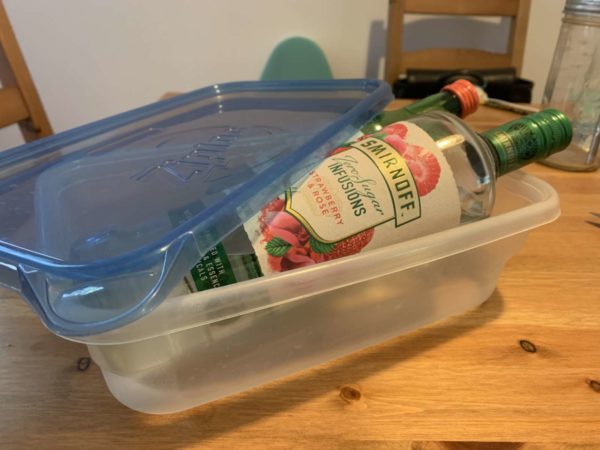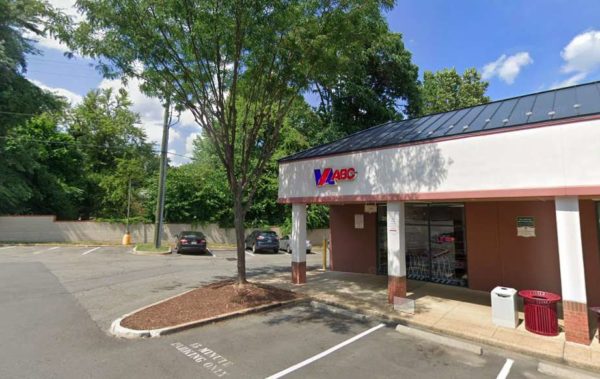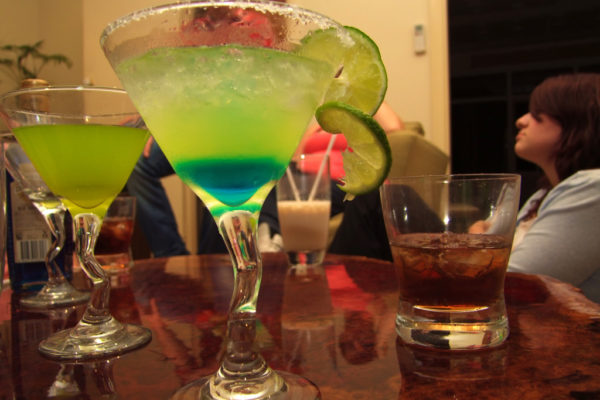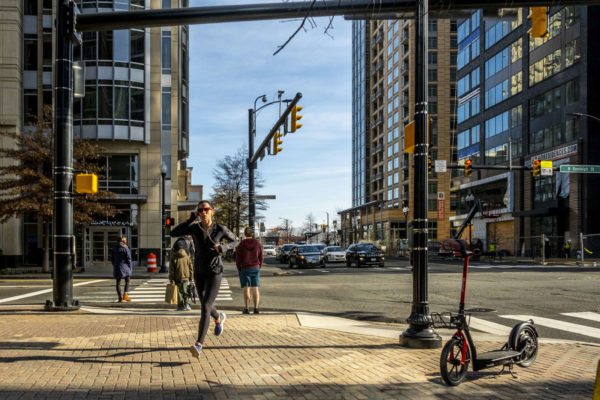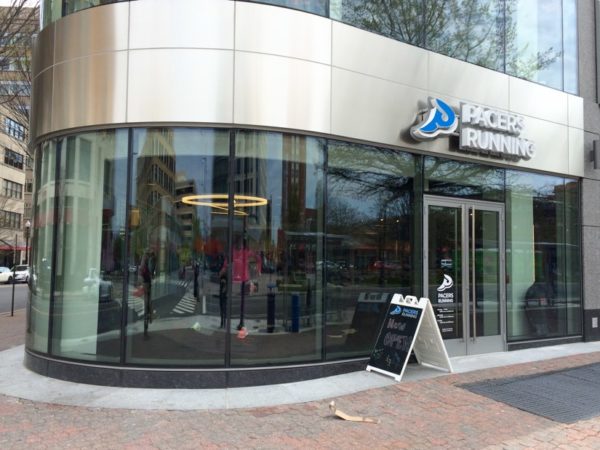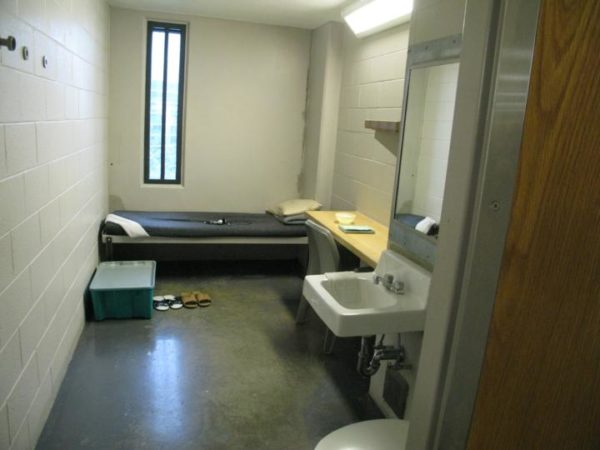Like a lot of local restaurants, it’s been a rough spring for Bun’d Up — which opened at Pentagon Row (1201 S. Joyce Street) in December — but its owner hopes warmer weather and the forthcoming delivery of speciality Asian alcoholic drinks can help turn things around.
Bun’d Up’s Scott Chung said the business is being inspected later this week for a new ABC permit that, if approved, would allow it to offer in-restaurant serving or home delivery of beer and wine.
“We’re trying to jump on board with the take-home drink trend,” Chung said. “This area allows people to drink in the courtyard and we’re hoping to do take-home delivery of alcohol as well. We’ll see how it goes, and try to expand to do more Asian-inspired drinks.”
Chung said from what he’s heard, frozen drinks have been selling really well at other local restaurants. Bun’d Up just got new ice machines and Chung said he’s hoping to start with frozen drinks to test the waters.
“We’re going to focus on Asian-inspired Korean beers and soju, and specialize in Japanese whiskeys,” Chung said.
The restaurant is still trying to figure out which distributor to use and the prices for the drinks haven’t been set in stone, but Chung said it will be comparable to other restaurants in the area.
In general, Chung said he’s hopeful alcohol sales can help boost a business that’s been hurting over the last few months of the pandemic.
“In the beginning, it was pretty rough, but we’re doing better,” Chung said. “It’s still not comparable to before all this started, but we do see some weekends better than others. I think alcohol and getting an outside presence will help.”
There are other ideas in the pipeline, but Chung said the immediate focus will be putting together food that pairs well with alcohol and drawing more attention to the outside space — assuming the good weather holds up.
“The weather has still been pretty funny,” Chung said. “We had a cold rush last week, but right now it’s hot and there’s a ton of people outside.”
Chung said he’s eagerly looking forward to the third phase of reopening.
“Once Phase 3 [of reopening] happens, the business should get a lot better,” Chung said. “Once Phase 2 hit, even before that started — when they announced Phase 2, we were busier. It took some weight off people’s shoulders that it’s getting better.”
Chung is wary of a second coronavirus wave, however, and he said that’s curbed his enthusiasm for rehiring a full staff.
“We get complaints about how long it takes sometimes to get food ready,” Chung said. “That’s probably the number one complaint we hear, but we can’t staff at earlier levels. With a potential second wave, don’t want to staff more people and then turn around and lay them off again.”
Chung said if the recovery continues, he’ll hire more staff to help speed food preparation and delivery, but for now he’s waiting out the summer to see how the virus continues to impact the community.
The cat’s out of the bag for to-go drinks with Virginians — and Arlingtonians in particular — expressing widespread support for keeping the practice around after the pandemic is over.
In a joint poll with the Virginia Restaurant, Lodging and Travel Association and the National Restaurant Association found that 78 percent of Virginians support making permanent current, temporary practices that allow restaurant customers to purchase alcoholic beverages with their takeout and delivery food orders.
“According to the recent data, customers are taking advantage of the order with approximately one in three Virginia adults who recently purchased takeout or delivery including alcohol with their order,” the Virginia Restaurant, Lodging and Travel Association said in a press release. “Additionally, 39 percent of restaurant patrons said the option of including alcoholic beverages with their order made them more likely to choose one restaurant over a competitor that does not offer alcohol sales.”
ARLnow’s own less scientific polling found that 91% of those who responded (2,839 people) were in favor of making delivery of alcohol permanent.
“The popularity of ordering mixed beverages to-go or for delivery shows that people want it,” said Sarah White, Operating Partner at Cowboy Café (4792 Lee Hwy) said in the press release. “We keep hearing from customers that it’s nice to order and enjoy a cocktail without getting dressed up and going to a bar. We keep hearing how happy they are to be able to relax in their own home and still feel like they’re receiving the full dining experience.”
Virginia allowed beer and wine to be delivered in March — relatively early in the pandemic — and eventually extended that to cocktails in April. Oklahoma has already made alcohol delivery by restaurants permanent, while many of the three-dozen states and territories that have allowed it temporarily during the pandemic are also considering making it permanent.
Staff photo by Vernon Miles
(Updated at 1:25 p.m.) The person behind the wheel of a car that careened down a hill and onto N. Glebe Road is now facing a criminal charge.
The crash happened this past Wednesday night near the Old Glebe Road overpass. It left the vehicle’s two passengers trapped and seriously injured, including one with life-threatening injuries. Firefighters used hydraulic tools to remove them from the heavily-damaged vehicle.
As of today both were still in the hospital, with one listed in stable condition and the other in critical condition, according to Arlington County Police.
Police say the driver — who walked away from the crash and suffered only minor injuries — has been charged with driving under the age of 21 after illegally consuming alcohol, a misdemeanor. The driver’s identity “is not releasable… in accordance to Virginia law,” according to ACPD spokeswoman Ashley Savage, implying that he or she is under the age of 18.
“This remains an active criminal investigation,” Savage said. “Anyone with information related to this incident and/or personal surveillance that may assist the investigation is asked to contact Detective J. Cox of the Critical Accident Team at 703-228-0491 or [email protected].”
(Updated at 3:10 p.m.) If you’re a regular at the ABC store in the Lee-Harrison Shopping Center just off Lee Highway, you might want to stop by to stock up this weekend because the store is temporarily closing.
Virginia ABC announced yesterday (Thursday) that several liquor stores in Northern Virginia would be consolidated starting this coming Monday, April 13.
“ABC supports its employees’ decisions to self-quarantine when necessary, which has impacted staffing levels in this region,” Virginia ABC said in a press release. “In order to maintain appropriate staffing and allow time to train additional personnel, ABC made the decision to temporarily close select stores in this area.”
The store is one of a dozen closing throughout the region. Virginia ABC said employees of the temporarily closed stores will have the option to work at other nearby locations to sustain operations.
The next closest ABC store is further east along Lee Highway at 4709 Lee Highway.
“ABC plans to reopen these stores on April 30, however the final decision will depend on the authority’s ability to properly and safely staff the stores,” Virginia ABC said. “All ABC stores currently operating across the commonwealth are open from noon to 7 p.m., seven days a week. The reduced operating hours allow staffing flexibility as well as more time for employees to clean and disinfect frequently touched surfaces and stock shelves.”
Virginia ABC also said some store operations have changed, including limiting the number of customers in the store at one time to no more than 10. Stores have also installed social distancing markers to ensure customers stand at least six feet apart from one another. The stores are also offering online ordering.
In addition to the temporary store closures, all Virginia ABC stores will be closed this Sunday in observance of Easter.
Photo via Google Maps
(Updated at 5 p.m.) A day after Gov. Ralph Northam issued an order allowing Virginia restaurants to offer mixed-beverages for takeout and delivery, a number of Arlington eateries are gearing up to serve cocktails to go.
Many restaurant in Arlington are still updating their menus before the order takes effect tonight at 11:59 p.m.
“We will be offering take out cocktails at Rhodeside Grill (1836 Wilson Blvd) as well as our sister restaurants, Ragtime (1345 N. Courthouse Road) and William Jeffrey’s Tavern (2301 Columbia Pike) in Arlington,” said Chris Lefbom, co-owner of Vintage Restaurants.
Renee Rojural, a brand and community manager for the Metropolitan Hospitality Group, said CIRCA at Clarendon (3010 Clarendon Blvd) and Open Road Rosslyn (1201 Wilson Blvd) will have cocktail menus to go sometime in the next few days.
Some, however, already have their new to-go cocktails planned and ready to sell.
“[We’ll have] curb-side and to-go custom cocktails,” a representative of Ms. Peacock’s Champagne Lounge (929 N. Garfield Street) said in a Facebook message. “32 oz jars filled with nothing but your favorites from our mixology team. Just add ice and enjoy!”
The Clarendon watering hole is also planning to offer 16 oz variants along with various bourbon mixes and a signature margarita.
An order by Northam last month allowed restaurants to offer beer and wine to go.
The Virginia ABC issued the following guidance on restaurants selling mixed drinks to go:
In order to maintain public safety, there will be restrictions placed on the service of mixed beverages in this fashion. Below are the highlights of the temporary regulation adjustment.
- Distillery licensees are limited to a maximum of two mixed drinks per delivery or takeout order that contain 1½ ounces or less of spirits per drink.
- Mixed beverage restaurants and limited mixed beverage restaurants are limited to four cocktails for each delivery or take out sale. Each order for delivery or takeout of cocktails must include a meal for every two cocktails purchased.
- Cocktails shall be packaged in a glass, paper or plastic container (or similar disposable container) or in a single original metal can with a secure lid or cap designed to prevent consumption without removal of the lid or cap (lids with sipping holes or openings for straws are prohibited).
- All recipients of delivery orders must be at least 21 years of age.
Photo via Dave B/Flickr
Bill Would Allow Open Containers in More Places — “A bill introduced in the Virginia General Assembly would let more shopping center developments offer open-container access under the state’s liquor laws. Sen. Barbara Favola, D-Arlington, introduced the measure… The change could theoretically benefit at least a couple of developments in Favola’s backyard,” including the Village at Shirlington and Market Common Clarendon. [Washington Business Journal]
County Board Organizational Meeting Tonight — “The Arlington County Board will elect its 2020 County Board chair and vice-chair at its Organizational Meeting on Thursday, Jan. 2, 2020, at 6 p.m. in the County Board Room, Room 307 in the Ellen M. Bozman Government Center. The Board also will adopt procedures for 2020 and name Board members to represent Arlington on regional bodies.” [Arlington County]
Bank Robbery Suspect Also Faces Charges in Bethesda — “One of three suspects who stole $60,000 worth of jewelry from a Bethesda, Maryland, shop in mid December was arrested Monday after robbing a bank in Arlington, Virginia, police say. Derrick Lamont Graham, 42, walked into the BB&T bank at 2200 Wilson Boulevard in Clarendon on Friday and gave a note to an employee that implied he had a weapon, Arlington County police said.” [NBC 4, WTOP]
New Year’s Eve Problems — From a local Nextdoor user: “Hi everyone I lost the keys to my apartment last night somewhere in Clarendon. If anyone has found a key chain with 1 single key, a fob, and a white “tile,” please contact me!” [Twitter]
 What’s Next with Nicole is a weekly opinion column. The views and opinions expressed in the column are those of the individual and do not necessarily reflect the views of their organizations or ARLnow.
What’s Next with Nicole is a weekly opinion column. The views and opinions expressed in the column are those of the individual and do not necessarily reflect the views of their organizations or ARLnow.
Antiquated Prohibition-era laws are still alive and well in Virginia.
These regulations have become a burden on restaurants and entertainment-oriented businesses operating in the Commonwealth. For Arlington and Northern Virginia at large, this means lost business opportunities to competitors in Washington, D.C. that don’t have to abide by such outdated regulations.
Democrats this past session passed a law that allows restaurants to merely advertise happy hour but opposed numerous other reforms. For example, the Virginia Alcoholic and Beverage Commission, or ABC, requires that 45% of total gross sales at restaurant establishments be comprised of food and nonalcoholic beverages while alcohol purchases should not exceed more than 55% of sales.
Senate Minority Leader, Dick Saslaw, has said, “If you can’t meet that ratio, you ain’t running a restaurant, you are flat running a bar. If you want saloons in Virginia, say so.”
So, here I am, saying so. We would like not only saloons, but restaurant wedding venues, music and dance venues, cigar lounges, cocktail bars, bottomless mimosas, and the like. A few examples of overburdensome regulations in Virginia that I hope Democrats will support overturning or reforming include:
Food to Alcohol Ratio
Virginia ABC’s 45/55% ratio rule should be overturned. The whole concept of having such a ratio to avoid drunkenness in our community is laughable. If you want to have a drink at a restaurant, you can have a drink. We are no longer in Prohibition. Bartenders are required to cut patrons off if they’ve had too much, but none are going to tell customers “sorry we’ve hit our food to drink ratio, so we’re going to have to stop serving you.”
What this really does is stifle certain business models like music venues (think: U Street Music Hall or 9:30 Club), cocktail bars (think: The Gibson or Left Door), art museums (think: Artechouse), and more. While I think we should wash the ratio altogether, Democrats have actually opposed even a reduction of the ratio, which seems irrational.
Open Bars for Events in Restaurants
Restaurants are also banned from allowing open bars for private parties. Want to host a corporate or conference event and provide an open bar? Head to D.C. Want to have your wedding reception at a local restaurant? Tough luck.
Wonder why Arlington’s New Year’s Eve celebrations are barely worth the cost, and make a large market of customers cross the river every December 31st for unlimited drink passes? Taking away this regulation would allow for a potentially large revenue generator and perhaps even help reduce the number of ARLnow articles we see about restaurant closings. This is silly, let’s scrap it.
Drink Specials
Drink specials such as bottomless or “2 for 1” deals are banned in Virginia. These regulations are essentially obsolete because they do allow for sort of bottomless where you pay a fixed price for your meal and as little as a penny for each drink. This rule has no tangible benefits and unnecessarily hinders restaurants from marketing competitively.
These regulations seem like one of those things that we will look back on one day and think to ourselves about how silly things used to be. During the next legislative session, I encourage our delegation to think about these issues in a new light and finally overturn these antiquated laws 86 years after Prohibition ended.
Nicole Merlene is an Arlington native and former candidate for Virginia State Senate. She has served as a leader in the community on the boards of the Arlington County Civic Federation and North Rosslyn Civic Association, as an Arlington Economic Development commissioner, in neighborhood transportation planning groups, and as a civic liaison to the Rosslyn Business Improvement District.
Sponsored by Monday Properties and written by ARLnow.com, Startup Monday is a weekly column that profiles Arlington-based startups and their founders, plus other local technology happenings. The Ground Floor, Monday’s office space for young companies in Rosslyn, is now open. The Metro-accessible space features a 5,000-square-foot common area that includes a kitchen, lounge area, collaborative meeting spaces, and a stage for formal presentations.
Excella, a Courthouse-based technology firm, has been selected as the lead partner in an effort to put together an app to detect alcohol misuse and risk of relapse.
The app, called Beacon, is designed to help medical professionals assess whether a patient is suffering from alcohol use disorder through a “combination of behavioral economics and advanced technology,” according to a press release. The product is still in development, but the goal is to be more effective than traditional methods of detecting alcohol abuse.
The company will utilize the work of Virginia Tech software development students at its Extension Center in Blacksburg. The company will also partner with Roanoke-based BEAM Diagnostics, Inc. to develop the app.
“The nation’s substance use epidemic presents massive challenges to every facet of our society, and we are committed to helping BEAM make the world better through tech innovation,” said Margaret Archer, Excella’s Director of University Programs. “Beacon is exactly the type of solution that our mentor-and-student development teams love to build, and we are happy to be a part of the solution.”
This isn’t Excella’s first foray into apps for a public good: the company previously developed MySpot, which helps homeless youth find nearby shelters and assistance. The press release also notes that the company has worked with government agencies for years to combat opioid fraud and abuse.
Image via Excella/Facebook
Caps Player Abandons Car on Glebe Road — “Monday was media day for the Capitals, their first practice of the postseason. [Lars] Eller was on his way to MedStar Capitals Iceplex when suddenly, his car broke down… in the middle of Glebe Road.” [NBC Sports Washington]
Task Force Ices Snow Proposal — “Thirteen of the 14 voting members of the task force ‘do not believe the county has made the case that snow operations on [the large government parcel at Old Dominion Drive and 26th Street North] must be expanded, especially given the small number of annual major storms.'” [InsideNova]
ACPD Marks Alcohol Awareness Month — “Alcohol Awareness Month, recognized each April, is a public health program designed to increase outreach and education on the dangers of alcoholism and issues related to alcohol. More than 300 establishments in Arlington County hold Virginia ABC licenses permitting the serving and sale of alcohol.” [Arlington County]
Amazon May Pay for Public Transit — “Amazon has actively promoted the use of public transit, such as by paying the full cost of its employees’ fare cards for light rail, buses and ferries — a perk that it is considering extending to new employees in Arlington. The company boasts that only a quarter of its Seattle employees commute to work by driving solo. Nearly 1 in 3 use transit, and more than 1 in 5 walk.” [Washington Post]
Arlington Touts Bike Benefits — “The County continues to build on the bicycle’s unique ability to provide clean short- and medium-range transportation that requires far less infrastructure and resources compared to automobile traffic.” [Arlington County]
Water Main Repairs Complete — Updated at 8:35 a.m. — Repairs to a burst 12-inch water main in Crystal City have been completed, but several roads in the area remain closed. The water main break cut water service to several buildings in the area, including a hotel. [Twitter]
Flickr pool photo by Kevin Wolf
An event in Clarendon next week invites runners to wash down Girl Scout cookies with whiskey.
Pacers Running, located at 3100 Clarendon Blvd, is hosting a social run around the neighborhood this coming Tuesday (March 5) with some special treats available at the end.
The attraction of the event is nominally a chance for runners to try out ON Running’s “CloudSwift” shoes. But the unusual twist comes after the run is over.
Representatives from Pittsburgh-based distillery Wigle Whiskey will be on hand after the event sampling some of its liquor offerings. And with each new spirit, they’ll recommend a Girl Scout cookie to pair with it.
“It’s an unbeatable combination,” promises a Facebook page describing the event.
The run will start at the Pacers shop at 7 p.m. All running paces are welcome.
File photo
Over the last few years, Arlington police and prosecutors have embraced a controversial tactic to deal with people who are frequently drunk in public — but most county residents don’t even know it exists.
The unusual process, known as “interdiction,” allows county prosecutors to ask a judge to declare someone a “habitual drunkard” if they’ve committed several alcohol-related offenses. That designation means these “drunkards” can be charged with a misdemeanor and jailed for up to a year if they’re found so much as buying or drinking alcohol again.
Virginia and Utah are the only states in the entire country with this sort of law on the books; the commonwealth’s statute passed just before the turn of the 20th century.
Accordingly, interdictions are far from commonplace in the county — prosecutors estimate that they’ve only interdicted 12 people dating back to September 2015, and that just 50 people around Arlington are currently deemed “drunkards.”
But the latter figure is the third highest for any locality across the entire state, according to statistics compiled by the Charlottesville-based Legal Aid Justice Center. Only Virginia Beach and Roanoke have more interdicted people, with 616 and 140 respectively.
And Arlington’s place on that list disturbs attorneys and advocates alike, given the brewing controversy over interdictions.
Commonwealth’s Attorney Theo Stamos, the county’s top prosecutor, dubs interdiction a “tool of last resort,” helping officers force people who are constantly drunk to finally get help. Yet critics believe it has a massively disproportionate impact on the homeless, and that police use it as a cudgel against people living on the streets who are struggling with substance abuse issues.
Others still argue that it robs interdicted people of due process — prosecutors request the “drunkard” designation in a civil hearing rather than a criminal one, meaning that even indigent defendants aren’t entitled to have an attorney present for the proceedings.
A legal challenge to the law on those grounds is currently working its way through federal court, while an Arlington public defender-turned-state lawmaker is working to repeal the statute in this year’s General Assembly session.
Yet, as those efforts proceed, some legal observers can’t understand why county police and prosecutors still pursue interdictions at all, given their stated commitment to other kinds of criminal justice reform.
“It’s inappropriate, unfair, and it doesn’t work,” Brad Haywood, Arlington’s chief public defender, told ARLnow. “In over 15 years as an attorney, I’ve served as a public defender in two of the few jurisdictions that still actively enforce this law. While I can think of many who owe their sobriety to residential alcohol treatment, intensive outpatient services and the expertise and compassion of mental health professionals, I can’t think of anyone who owes their sobriety to interdiction. Not a single person.”
Criminalizing the homeless, or a ‘last resort’ for addicts?
To Haywood, who has strongly criticized Stamos in the past, interdiction effectively criminalizes homelessness. After all, he points out that the law “only targets people who possess or drink alcohol while visible to others,” which essentially leaves just the homeless, many of whom turn to alcohol to make it through the day or are gripped by addiction.
“They live their entire lives in public,” Haywood said. “If they have alcohol, drink it, or are drunk, they will be seen, and under this statute, they will be arrested.”
Of course, he believes there are other “problem drinkers” around the county. As he puts it: “I read ARLnow, I know what happens on the Wilson Boulevard corridor on weekends.”
But he argues police have embraced a completely different strategy for those cases, choosing to work with popular bars to encourage stronger partnerships and prevent arrests, even though the circumstances are similar.
“If the goal of interdiction is to curb problem drinking generally, and to be equitable about it, then I’d think the Arlington bar scene would receive some attention,” Haywood said. “It hasn’t, obviously, and I’m not suggesting it should, but if it had, you’d have certainly have heard about it by now. “
However, law enforcement officials note that they’re not using interdictions indiscriminately, or targeting all homeless people. County police spokeswoman Ashley Savage says officers ask for interdictions “only in the most significant cases, where public safety resources are utilized for the same individual on a [recurring] basis.”
She adds that police take into consideration whether people are committing “criminal violations while intoxicated” as well as “concerns for the safety of the individual or those around them” in making such a decision.
“The goal is not to wantonly incarcerate people,” Stamos said. “A lot of these people are not mindful of their surroundings and can be victimized… and it’s a safety concern. We see pedestrian accidents every single day, and in some cases it’s because people are wandering into the street.”
Stamos says that, in many cases, her office only interdicts people after family and friends urge some sort of drastic step to force them to get help.
For instance, Stamos says prosecutors have interdicted four people since July 2017 — and those people had an average of 19 prosecutions each for alcohol-related offenses before being declared a “drunkard.” Prosecutors pursued a high of 37 cases against one person; the person with the smallest total had been prosecuted four times, and even then they’d been drunk during 35 different encounters with county medics over a two-year period.
“This is absolutely a last resort to hook them up with services,” Stamos said. “It’s a deprivation of liberty, but it’s done with the purpose of getting these people in jail, and getting them sober.”
It may not be a perfect solution, but county officials say they work hard to find people with substance abuse issues once they’re in jail, then get them help.
Kelly Nieman, who works on the county’s forensic jail diversion team, says Arlington has been a leader across the state in finding ways to treat inmates’ mental health issues or substance abuse problems, which are often interconnected. She hopes that helps stop people from “revolving in and out of the system.”
“We have a model to intercept individuals at junctions when they butt up against the legal system,” Nieman said. “We screen people for services and develop a release plan to get them back into the community.”
Stamos says she’d love to have another way to “induce compliance” with a treatment program for homeless addicts, but she just doesn’t see one available to her prosecutors.
“Give us another tool, and we’ll use it,” Stamos said. “If you do away with this statute, give us more money for treatment services.”
While he acknowledges that the county does good work in this area, Haywood pushes back against the notion that workers at the county jail should be “front-line caretakers for the chronically mentally ill, which is what most interdicted people actually are.” He’d rather police connect the homeless to dedicated treatment services, rather than simply sending them to jail.
“That’s a job for mental health professionals, in settings appropriate to the treatment of addiction and serious mental illness,” Haywood said. “If what we want is to help the most destitute, vulnerable people in our community, we should ensure they have access to intensive mental health and substance abuse treatment services, and stop pretending we’re making the situation better by locking sick people away so the public can’t see them.”
Challenging the process
Elaine Poon, the managing attorney for the Legal Aid Justice Center, also believes that the very manner in which the statute is written makes the process punitive, not rehabilitative. Her group is leading a legal challenge to the law, arguing that interdictions create a vicious cycle for people declared “drunkards.”
Poon notes that police can — and do — pursue all manner of charges against people who are drunk in public. What sets interdictions apart is that people designated as “drunkards” can be prosecuted for simply drinking alcohol or having it in their possession, which she believes help police wrack up charge after charge against the same people.
According to Stamos’ own statistics, the 12 people her office have interdicted since 2015 have subsequently been prosecuted an average of three times each for possessing alcohol or appearing drunk in public. Poon believes this shows how interdicting someone can simply compound the time they spend in jail, criminalizing people “just for being who they are: a homeless person on the street.”
Poon feels this is all the more disturbing because many people who are declared “drunkards” don’t understand the process, and don’t have legal representation at the hearing deciding whether they’ll be interdicted in the first place. Most homeless people rely on the service of court-appointed public defenders, as they can’t afford their own lawyers, but the civil nature of the interdiction proceedings means that a judge is not required to assign them counsel.
Stamos says her prosecutors go to great lengths to find people set for an interdiction hearing, and get them to a sign paperwork acknowledging they’re aware of when they can come to court.
But Poon points out that many of her clients easily lose any forms they’ve been given by police — they don’t have homes, after all — and don’t attend the hearings, or are too mentally ill to understand a complex legal matter.
Jennifer Carroll Foy, a public defender in Arlington, says she’s often come to court and made such arguments to a judge about her interdicted clients. But her protests are commonly dismissed as a “collateral attack” on a civil case — even though that case has a direct impact on the charges her clients are facing.
“It may be a civil process, but there are criminal ramifications,” Foy said. “If there’s a possibility you’ll go to jail, I absolutely believe an attorney should be there.”
Stamos says her hands are tied by the statute in this case, arguing that public defenders “have no role” under the law in these interdiction cases.
“Their frustration shouldn’t be with my office, it should be with the system,” Stamos said.
Changing the law
Foy is in a unique position to address such displeasure with the law; she doubles as a state delegate representing parts of Prince William and Stafford counties, and has introduced legislation to repeal the “habitual drunkard” statute this year for a second time in a row.
Her bill died quickly in a subcommittee last year, but she’s more optimistic this time around, now that she’s worked to raise awareness about the issue.
“The most difficult part is educating people about it, because they don’t even know this law exists,” said Foy, a Democrat representing the House of Delegates’ 2nd District. “I hope it picks up a lot more traction this time.”
Though Democrats have a bit more clout in Richmond after a wave election in 2017, the party is still in the minority in both chambers of the General Assembly. That means Foy will face an uphill battle in getting anything passed, at least for now.
Poon is hopeful that the courts could provide some relief instead. A three-judge panel on the Fourth Circuit Court of Appeals rejected the case last August, but Poon’s organization is appealing the ruling to the full court, which could have the final say on the law’s constitutionality.
However, she says it’s “a mystery” when, or if, the court will agree to take the case.
In the meantime, interdictions in Arlington continue. County police referred two more people to Stamos’ prosecutors to be designated as “drunkards” just last fall.
“We have to do better when it comes to how we help the most vulnerable class of citizen in this state,” Foy said. “We’re not doing a very good job right now.”
File photo


